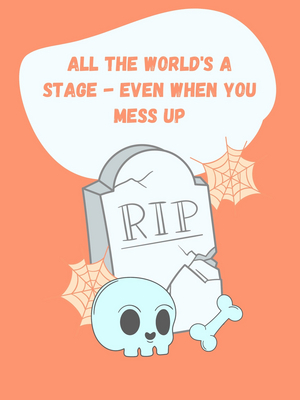Student Blog: All the World's a Stage - Even When You Mess Up
How on-stage mishaps have taught me off-stage lessons
 It's back-to-school season, which, for washed-up college graduates like me and my Class of 2021 friends, brings back countless memories of anticipation, excitement, and the change of seasons - both literally and figuratively. This is the first time in 17(!!!) years that I have not frantically prepared to give myself the best start to an academic year as possible, which is still hard to wrap my head around, even though I have a full-time job and plenty of friends experiencing the same identity shift as I am. While I am no longer a student in the traditional sense, I know all too well that if I give myself the space to reflect on things that happen to me, I will never stop learning.
It's back-to-school season, which, for washed-up college graduates like me and my Class of 2021 friends, brings back countless memories of anticipation, excitement, and the change of seasons - both literally and figuratively. This is the first time in 17(!!!) years that I have not frantically prepared to give myself the best start to an academic year as possible, which is still hard to wrap my head around, even though I have a full-time job and plenty of friends experiencing the same identity shift as I am. While I am no longer a student in the traditional sense, I know all too well that if I give myself the space to reflect on things that happen to me, I will never stop learning.
I was with some friends the other night from my hometown, and all of a sudden, the topic of our college admission essays came up in conversation. While they are now distant memories that we laugh about now, back then, the process of writing those 600-word pieces and having them constantly revised after each new set of eyes was painstaking, stressful, and most notably, personal. It felt like an impossible task: synthesizing everything we'd learned in 17 years of life to show admissions who we were, how we think, and what we may become, all in a few paragraphs. But I knew back then, and know now, that my experiences in theatre have shaped me in endless ways. Therefore, I wrote that fated essay on how the basics of improvisation have taught me to remain as flexible and level-headed as possible in the face of adversity - and to make the best out of any situation. Below is one section of my college essay, which not only granted admission to some of the best and most formative years of my life, but also draws upon what could have been a terrible on-stage mishap if it weren't for mine and my cast's quick thinking and adaptability.
--------------------------------------------------------------------------------------------------------------
"I craved the insatiable thrill of regaining control of situations that were ostensibly daunting, but were actually rewarding. As I went to theater camps and joined the drama club in both middle and high school, I soon perfected the art of making mishaps appear seamless. I even learned the word for it: improvisation.
Laughing Stock, a comedy of errors, depicts a struggling theater company that produces three awful plays that test both its cast's and crew's resilience. Like the actors that portrayed them in my high school's production, the characters learn to manage imperfections on and off stage. On our real opening night, my castmate threw Yorick's skull at me on stage during our fictitious company's production of Hamlet, fully expecting me to catch it as I had in countless rehearsals. Fate laughed as I dropped the flying prop, which promptly fell to pieces.
Alas, poor Yorick.
This, along with the palpable energy of the auditorium, catalyzed my response: I profusely apologized and remained in tune with not only my anxious character but also my overwhelming sense of panic.
Life truly does imitate art. The audience didn't suspect a thing."
--------------------------------------------------------------------------------------------------------------
Those who know me best know that I am my own worst critic - I'm quite anxious and cautious in the face of uncertainty and unfamiliarity, and yet I'm constantly terrified of making mistakes. Theatre - whether working onstage or behind the scenes - has taught me to strive for my best work, of course. But the thing that has always truly pushed me about the art is that it doesn't teach perfection - it teaches preparation. Like life itself, live theatre doesn't include do-overs, but it does include missing lines and cues, sustaining injuries, breaking props, and ripping costumes. It also includes sharing those moments with others, and handling them together. However, those things don't have to be automatically bad - in fact, they can make the experience (and the people involved) infinitely better. Things are bound to go awry at some point, but success is ultimately determined by how people handle trials and tribulations. I was able to put this metaphor into words in my Common App essay, but little did I know that I'd continue adhering to this mentality whenever the unforeseen arose. Sure, college entailed many growing pains, difficult situations, and changes - which, to me, tend to be daunting no matter what. But learning how to rehearse - I mean prepare - for the worst while working towards the best in any situation has brought me a wealth of skills and insight on stage, in the wings, and in my adult life.
Videos


